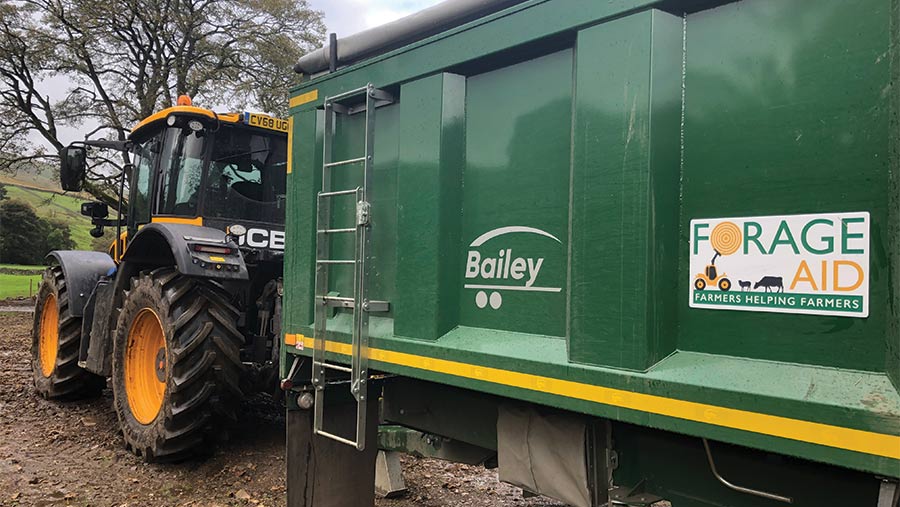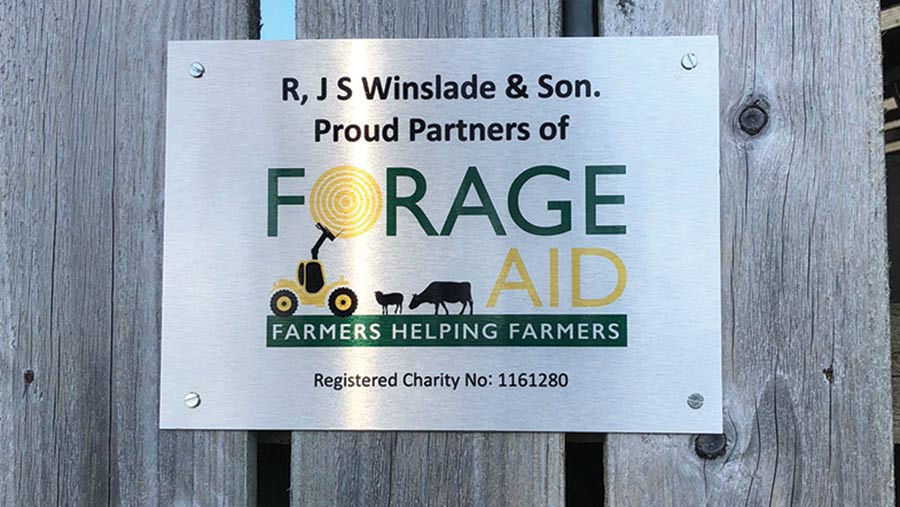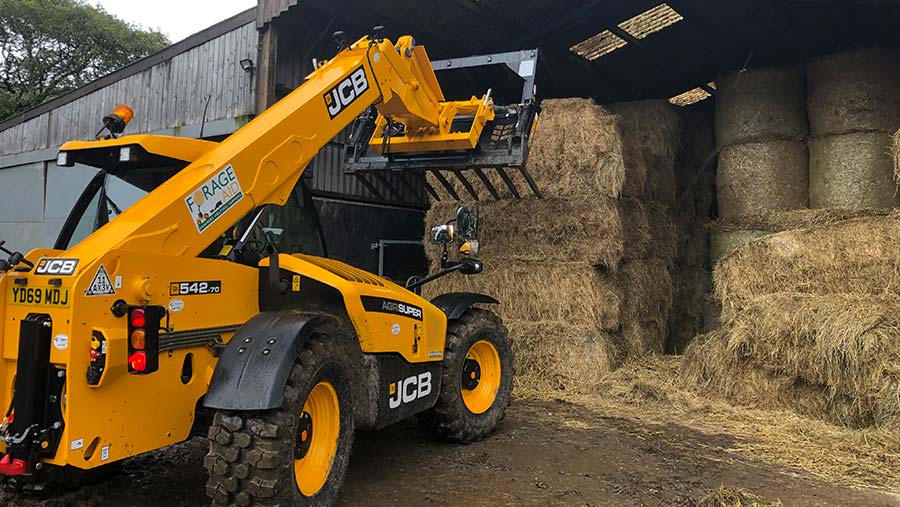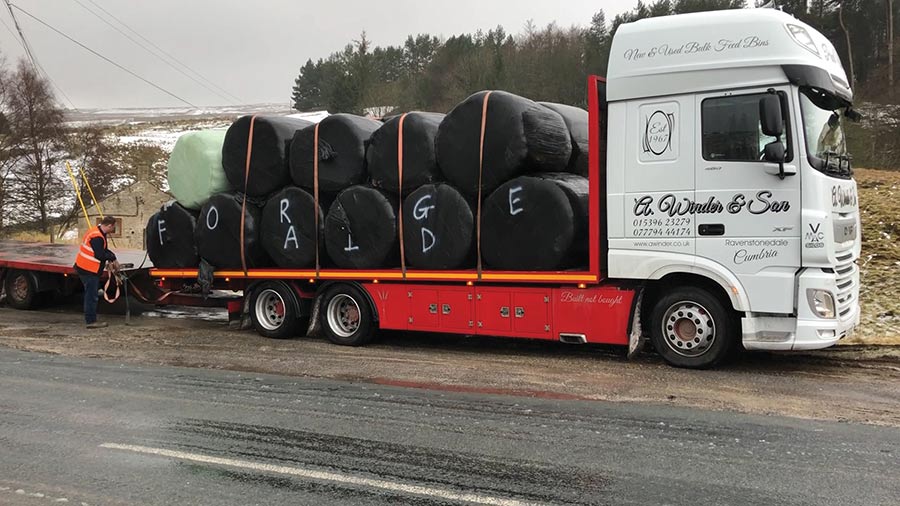Forage Aid supports farmers in need for a decade
 © Forage Aid
© Forage Aid Forage Aid has been supporting livestock producers hit by extreme weather and other crises for 10 years.
Since its formation in 2013, Forage Aid has delivered about £850,000 worth of feed and bedding to 140 farmers.
The charity’s sole aim is to provide emergency, short-term help to relieve livestock suffering.
See also: Mind your head tackles mental health barriers in farming
The first loads saw donations delivered in Wales, Cumbria and North Yorkshire to farms hit by heavy snowfalls in March 2013.
The following February, floods devastated holdings in Somerset, with thousands of cattle, sheep and other animals evacuated from 30 farms.
A local action group including the NFU, Farming and Wildlife Advisory Group, the Royal Agricultural Benevolent Institution and the Farming Community Network were joined by Forage Aid, resulting in 200 loads of aid being delivered.
Since then, there have been several significant floods – such as Cumbria (2016) and North Yorkshire (2019) – as well as other emergencies.
In some cases, bagged feed is also provided. If free delivery cannot be arranged, then recipient farmers may be asked to pay for or contribute to the transport costs.
A network of regional co-ordinators and contacts works to identify need, as well as to source and organise the deliveries.
Forage Aid founder Andrew Ward says: “We can find the forage needed quickly – in the quantity and bale sizes needed, and through our network of friendly hauliers – to rapidly get it out to farms.
“We don’t yet know what will be short by late winter, but we’re gearing up with commitments of forage from donors.
“What we really need is a kind spring, so people can get an early turnout.”
Merger with Addington Fund
This summer saw the merger of Forage Aid with the long-established farming charity the Addington Fund.
Addington’s main focus is providing affordable rented and shared ownership housing for retired farmers, and those who have to leave their farming homes.
It also gives grants to farm workers, and has a disaster relief fund to support farms severely affected by disease or prolonged bad weather.
Disaster relief
The two charities had already been working together and the disaster relief element of Addington will now be extended under the Forage Aid brand.
The merger will mean resources can be pooled, making administration more efficient as well as reducing potential competition for funds.
Terms of reference are being finalised following the merger, with Andrew Ward and Forage Aid trustee Tom Hind both becoming trustees of Addington.
Andrew will head the Forage Aid committee, which also includes farmer and co-founder James Winslade.
Committed supporter
Somerset farmer James and his family, along with many others, suffered very badly in the 2014 floods, with up to 5.5m of water across 340ha of their farm.
Since being helped by Forage Aid, he has been a committed supporter and activist on behalf of affected farmers.
One question under consideration is whether those affected by TB should be eligible for help through Forage Aid.

© James Winslade
Wider rural support
Although it works under the banner of “farmers helping farmers”, Forage Aid’s work involves many other members of the wider rural community.
As well as the fodder donations provided by farmers, a huge contribution has been made by hauliers donating their time and trucks.
Support comes also from many farm suppliers and manufacturers.
Practical donations, such as machinery loans, have come from JCB and Bailey Trailers in particular, but there is a long list of other national, international, regional and local supporters.
This includes: Tesco, HSBC, Syngenta, BASF, Agrii, Simba, Monsanto, CF Fertilisers, Branston, Camgrain, Crediton Mill, Mole Valley Farmers, Smart Agricultural Services, Bigwoods Agri, Ripon Farm Services, Arla UK, Chandlers Farm Equipment and Compass Tractors.
“Help from local rural supply businesses is also invaluable,” says Andrew.
“For example, they will deliver hand bales on their smaller lorries to some farms in Wales and Cumbria which are inaccessible for artic wagons.”

© Forage Aid
Who does Forage Aid assist?
The charity provides practical help to farmers across Great Britain. To be eligible, they must have a Defra holding number, or the equivalent, and have been affected by an extreme weather event.
An application form detailing fodder stocks and livestock numbers helps the charity assess the level of need.
Rural outreach
Forage Aid works closely with other farming and rural charities.
For example, those looking for its support will often be visited by a partner organisation to help them fill out the Forage Aid application forms.
Forage Aid volunteers may notice warning signs that help is needed in other areas too.
“Quite often our people will pick up on other problems and suggest other charities that could help,” says Andrew.
“It works very well. It could be anything from help with buying school uniforms to mental health support.”
In the same away, other support organisations will point those in need to help from Forage Aid.
Ways to support Forage Aid
Forage Aid relies on a wide range of individuals and organisations, with an ongoing need for:
- Regional volunteers Helping in times of crisis, regional volunteers need a good working knowledge of agriculture and a desire to help farmers in emergencies
- Hauliers To work with the logistics co-ordinator and regional co-ordinators on the ground. A good understanding of the farming sector is needed, along with the ability to mobilise quickly
- Volunteers This can involve behind-the-scenes work or physical help, whether regular or in times of crisis
- Fundraisers On a group or individual basis. Also there is a Forage Aid Trophy for fundraising by Young Farmers’ Clubs
- Corporate support Practical help and financial donations from local and national businesses have been invaluable so far, and further help of this type is needed.
Donation routes
Donations to Forage Aid can be in the form of feed or bedding during crises, or cash sums to support its work.
Money donations can be made through the Addington Fund website at addingtonfund.org.uk/donate
Alternatively, cheques can be made payable to “Forage Aid” and sent to:
Addington Fund Inc Forage Aid, Unit 9 Barford Exchange, Wellesbourne Road, Barford, Warwick, CV35 8AQ
Case study: Doug Barningham, North Yorkshire
Yorkshire farmer Doug Barningham lost 120 sheep and 300 silage bales at Home Farm, Arkengarthdale, Richmond, in summer 2019.
By March 2020, he had received more than 200 bales of silage and haylage from Forage Aid.
The charity also arranged the disposal of hundreds of flood-damaged silage bales to an anaerobic digestion plant.
“We had tremendous help from Forage Aid and from many local farmers and the young farmers,” says Doug.
“It helped us get through a really tough period.”
Watch a video interview with Doug on how Forage Aid delivered vital support after the flooding.

© Forage Aid
How to get help from Forage Aid?
Farmers needing support can call the helpline on 01926 620135 or email forageaid@addingtonfund.org.uk
Farming Help partnership
Forage Aid is part of Farming Help, which assists anyone who is, or has been, in farming and is suffering from financial or emotional difficulties.
The Farming Help partnership is a collaboration between the Addington Fund, Farming Community Network, Forage Aid and the Royal Agricultural Benevolent Institution, with support from The Prince’s Countryside Fund.
Each charity member works in a different way, but the umbrella of Farming Help means assistance can be accessed through one phone call.
Farmers in need can access free, impartial and confidential support from all three charities.
The helpline is open 7am-11pm every day of the year, on 03000 111 999.
